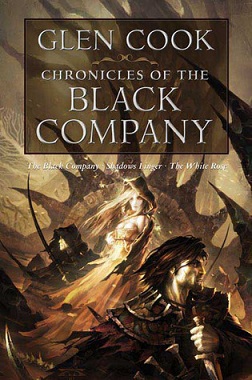
Most fantasy series take place in an imagined world filled with powerful magic and fantastic creatures. As a matter of course, the stories tend to focus on the lives and doings of the most powerful and influential beings of their age, the better for readers to a get a proper sense of the epic scale of events as they unfold as well as to be sure of having a front row seat to the most spectacular battles. Glen Cook’s The Black Company series is set in a unnamed world that is no less wondrous than that of his fellow fantasy writers. Here there are the usual ancient evils and prophecies; sleeping gods and sorcerors potent enough to create storms or turn large companies of soldiers to ash; monsters such as were-panthers, talking stones and flying mantas.
What sets this series apart is its focus not on the generals and nobility, the most puissant mages and most renowned generals, but on the lowly common foot soldiers that make up the bulk of every army. In this case, the spotlight is on the Black Company, a band of mercenaries who peddle their services to the highest bidder. Chronicles of the Black Company is an omnibus volume that brings together the first three novels of the series, The Black Company, Shadows Linger and The White Rose. The first of these books were published in 1984 but I only heard about this series several years ago from QT3.
Together, this trilogy chronicles the company’s dealings with the Empire, a despotic regime led by an immortal evil sorceress. The story is told from the perspective of Croaker, the company physician and annalist, which means he is the keeper of the company’s histories. It is his job not only to safeguard the centuries-old traditions of the company but also to lift morale and forge a sense of brotherhood by recounting stories of the company’s past while also adding new adventures to the annals. The name Croaker, by the way, is a good example of the succinct style Cook likes to use. The leader of the company is known simply and only as the Captain, just as the second in command is known as the Lieutenant. One of the hedge wizards who serve in the company is known as Silent because he never speaks while another is called One-Eye for similarly obvious reasons.
In the first book, we encounter the Black Company engaged by the governor of a city to bolster his meager forces in the face of growing resentment among the populace towards his rule. This commission turns out to be an ill-fated one however as the company, while professional and extremely effective as an elite quick strike force, is woefully inadequate to the challenge of pacifying the frenzied citizenry of an entire city. So despite misgivings about being dishonorable, they find an escape clause from their contract and in the process massacre their former master’s guardsmen in their barracks while they sleep to forestall any pursuit. As you can tell, the last thing Glen Cook wants is for the reader to think that the Black Company.
Eager for an out, the company throws in their lot with a mysterious mage garbed in black leather. They discover to their dismay that this is one of the Taken, ancient and powerful sorceror servants of the Lady who rules the Empire. And so the stage is set for the Black Company to serve as the Lady’s elite commandos, charged with stifling dissent and destroying the mounting rebellion against her rule. While the Lady and her minions are unquestionably evil, the members of the company are merely amoral at worst. They’re just ordinary grunts out to survive like everyone else and it doesn’t help the good guys’ case that the soldiers of the rebellion are, if anything, even more heinous in their methods to fight the Lady.
All this sounds like a huge change from run of the mill fantasy and indeed at its best, this Vietnam War approach to fantasy is great to read. I particularly enjoyed the detailed account of how the company prepares to hunt a powerful monster, knowing that they are far outmatched and that their losses will be terrible. Unfortunately, Cook doesn’t seem to be able to pull this off consistently and it’s annoying how the company relies so much on their hedge wizards. Sometimes it reads more like the adventures of the hedge wizards plus a handful of equally awesome guys than that the travails of an ordinary infantry company.
As for the prose, Cook uses a very sparse style, which is jarring if you’re used to the florid descriptions of most fantasy writers. For the most part, this works and allows the action to proceed quickly. But, still, there are times when this feels more like casual or even lazy writing than a deliberately affected style. While I can understand the idea behind using nicknames for the members of the company, it feels very odd when almost everyone else goes by nicknames too. The Taken for example are known as such pithy names as Limper, Feather, Journey, Howler etc.
Overall while the whole thing is a decently entertaining read, I think that Cook doesn’t quite manage to pull off what he intended. I’d have preferred something even more hardcore and down to earth than this. I also note that the first book is clearly the best of the three because the books seem to progressively degenerate into more standard fantasy fare over time. So while I’m glad to have found this volume and read it, I don’t really feel compelled to continue reading the series. It’s a very novel approach to fantasy that I’m surprised came out in the 1980s but it didn’t go far enough and given its uneven quality, it’s not hard to see why it didn’t achieve widespread popularity.
One thought on “Chronicles of the Black Company”